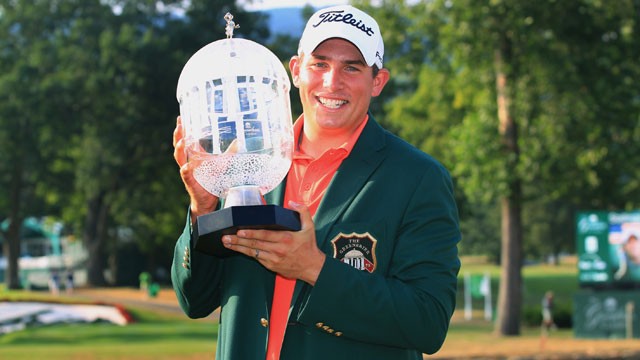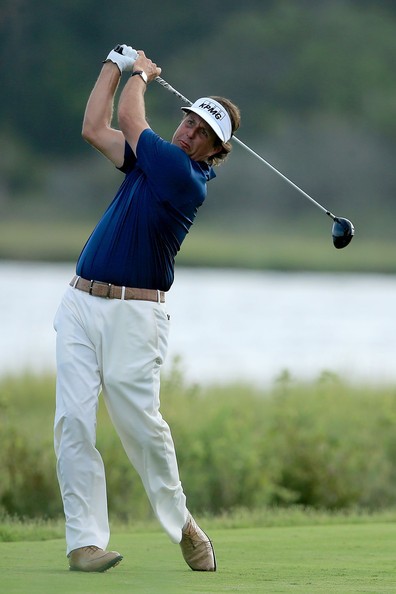
Scott Stallings will be an underdog at this week’s FedEx St. Jude Classic. His gallery, let’s just say, would lose a rumble with Phil Mickelson’s. But the 31-year-old pro from Worcester, Massachusetts, is, in many ways, the embodiment of life on the PGA Tour. Traveling from one tournament to the next, aiming to, first, make the cut for weekend play, and then climb the leaderboard where the paychecks get fatter and the headlines larger. Stallings has three Tour wins to his credit (the last at the 2014 Farmers Insurance Open). This will be his sixth straight appearance at the FESJC, where he shot four sub-70 rounds in 2013 and finished in a tie for second behind Harris English. (Stallings missed the cut last year.) The Tennessee Tech alum — Stallings now lives in Knoxville — has earned $594,797 this season and ranks 112th in the FedExCup standings.
You have an interesting origin story for a golfer. You played team sports as a kid, then you saw a light of sorts. Share that story.
When Tiger Woods won the Masters in 1997 [when I was 12], I quit everything else. I stuck just to golf. Golf struck my interest and I decided it was something I wanted to pursue as a career. It appealed to me as something different, and very exciting.
At what point did you realize you might be able to make a living on the PGA Tour?
I still struggle with that sometimes today. When I was a junior in college I was an All-American at a small school that had some success. I decided I wanted to give it a go and see if I could compete at the next level.
What’s a strength of your game these days, and where are you focusing on improvement?
My short game’s been coming around a lot. I’ve been working hard. I’ve always hit the ball pretty well [off the tee], but my short game has let me down in pressure situations. I’ve tried to make it a point of contention every day when I practice, to get to the point where it’s a strength, an asset that keeps me in tournaments. I’d like it to become the most important part of my game, instead of just something that’s there in case I needed it.
How’s the putter?
I’ve been working on [putting] for three or four months. We’re getting to the point of the season where I feel like I play my best, when it gets hot. We’re playing in areas of the country where I feel really comfortable, especially coming up to Memphis, my home state. The hotter the weather, the better I play.
What have you come to enjoy about the FESJC?
Growing up, I played some junior events at TPC Southwind and thought it would be cool to be a part of this as a pro. I watched it in college. The charitable aspect with St. Jude, especially being a father of two now . . . well, you obviously hope your kids never have to be in a facility like that. But it’s nice to know that if it was necessary, they’d have a place to go. The tournament does a heckuva job in supporting [the hospital]. For anyone with kids [on the Tour], it’s a no-brainer to play [in Memphis]. My dad’s from west Tennessee, so I get to play in front of friends and family. I love the area and I love the golf course.
Is there a specific hole at TPC Southwind you find most challenging?
I think the golf course is underrated. If you play well, you’ll be rewarded. If you play badly, it’s gonna show. There are not a lot of tricks to the course. It will show who’s playing the best.
Looking back at your three Tour victories, is there a consistent thread to your performances? Something you’d like to bottle?
Not really, because I’ve won three different ways. I’ve won from behind, won from in front, and won in a playoff. All I want to do is be in position [to win] coming down the stretch to 18.
You’ve taught golf to wounded Army veterans. That must have been especially inspiring.
My father-in-law is a Marine, and my brother-in-law is an Army vet and spent 18 months in Iraq. They were fortunate to not have any major injuries to deal with, but they’ve been around enough guys to see how war can affect people, not just physically, but mentally as well. The game of golf can be an outlet for the guys, provide some comfort to a situation. We wouldn’t be where we are without them. They teach us way more than we teach them.
What’s the most important swing tip you’ve been given?
I don’t know if it’s a swing tip; it’s more of a mentality. The moment you let other people affect how you do things is the moment you’ve lost it. You need to consistently learn every day and pick up tips, but you need to own your game and know how you play. Know what you do when you play well. Don’t try to model your game after certain individuals. You have to play the way you’re most comfortable.
